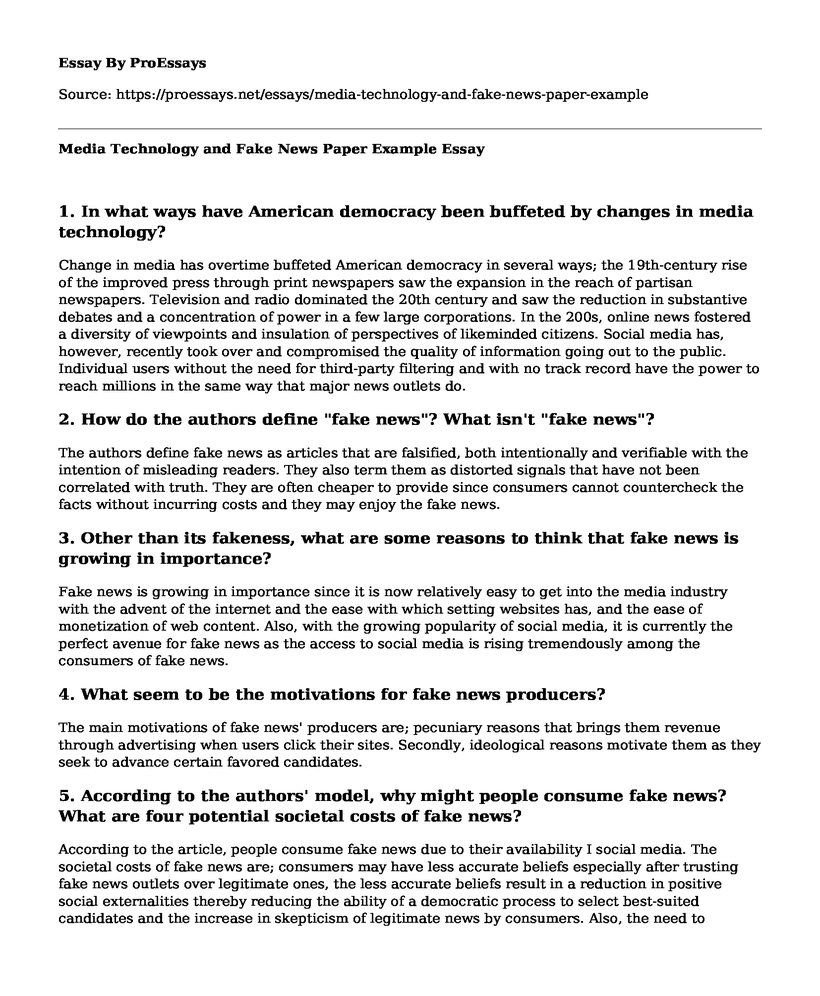1. In what ways have American democracy been buffeted by changes in media technology?
Change in media has overtime buffeted American democracy in several ways; the 19th-century rise of the improved press through print newspapers saw the expansion in the reach of partisan newspapers. Television and radio dominated the 20th century and saw the reduction in substantive debates and a concentration of power in a few large corporations. In the 200s, online news fostered a diversity of viewpoints and insulation of perspectives of likeminded citizens. Social media has, however, recently took over and compromised the quality of information going out to the public. Individual users without the need for third-party filtering and with no track record have the power to reach millions in the same way that major news outlets do.
2. How do the authors define "fake news"? What isn't "fake news"?
The authors define fake news as articles that are falsified, both intentionally and verifiable with the intention of misleading readers. They also term them as distorted signals that have not been correlated with truth. They are often cheaper to provide since consumers cannot countercheck the facts without incurring costs and they may enjoy the fake news.
3. Other than its fakeness, what are some reasons to think that fake news is growing in importance?
Fake news is growing in importance since it is now relatively easy to get into the media industry with the advent of the internet and the ease with which setting websites has, and the ease of monetization of web content. Also, with the growing popularity of social media, it is currently the perfect avenue for fake news as the access to social media is rising tremendously among the consumers of fake news.
4. What seem to be the motivations for fake news producers?
The main motivations of fake news' producers are; pecuniary reasons that brings them revenue through advertising when users click their sites. Secondly, ideological reasons motivate them as they seek to advance certain favored candidates.
5. According to the authors' model, why might people consume fake news? What are four potential societal costs of fake news?
According to the article, people consume fake news due to their availability I social media. The societal costs of fake news are; consumers may have less accurate beliefs especially after trusting fake news outlets over legitimate ones, the less accurate beliefs result in a reduction in positive social externalities thereby reducing the ability of a democratic process to select best-suited candidates and the increase in skepticism of legitimate news by consumers. Also, the need to provide high precision and low biased reporting drops due to the low demand.
6. What claims do the authors make about the influence of fake news in the 2016 US election? Who did it seem to influence more, and how?
The authors claim that social media was the avenue of choice for the dissemination of fake news in 2016 since it is not easy for consumers to determine the truth in the stories. The fake news seemed to influence Democrats more than Republicans as the authors' data shows that Republicans were harder to influence.
Cite this page
Media Technology and Fake News Paper Example. (2022, Jul 28). Retrieved from https://proessays.net/essays/media-technology-and-fake-news-paper-example
If you are the original author of this essay and no longer wish to have it published on the ProEssays website, please click below to request its removal:
- Interview Regarding Arabs Culture Paper Example
- Summary and Response on Emmett Till's Casket Painting Paper Example
- Walt Disney Animation With United States History - Essay Sample
- Essay Sample on Social Media Crime
- Essay Example on The Life of Arnold Schoenberg: An Aussie-American Composer's Rise From Humble Beginnings
- Documentary Analysis Essay on Huey Long
- Researching and Writing Essays: Resisting Biases and Viewpoints - Essay Sample







